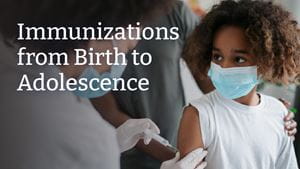
Parents and caregivers do many important things to make sure their child is safe. One of the best steps to take is to ensure your child has all of their immunizations up to date.
Katie Sussman, MD, a pediatrician with Rochester Regional Health, treats children each day and knows of the most up-to-date immunization schedule for children.
When it comes to child vaccinations, all Rochester Regional Health Pediatrics offices follow the CDC recommendations on immunizations. This begins on the first day of a newborn’s life and continues into their adolescence.
The CDC created its schedule for infant and child immunization after decades of testing and clinical research. Some vaccines are a single dose, while others require multiple doses. All vaccines ultimately serve the same purpose: To protect your child from contracting diseases that cause serious illness or death.
Most pediatric offices follow the general schedule below for administering vaccines. Each office may time vaccinations differently.
At birth
2 months
4 months
6 months
12 months
15 months
18 months
“By the time your child turns two, they should have all of their routine vaccinations of infancy and young childhood completed,” Dr. Sussman said.
4 years
This is the age where booster shots are administered for reinforced immunity against certain diseases. These vaccine doses are required for children to attend UPK or kindergarten in public school districts.
5 years
11 years
16 years
All of the vaccines listed above are approved by the FDA and recommended by the CDC. Each one has been vigorously studied and reviewed and been determined to be safe and effective. Doctors and medical providers have administered these vaccines to hundreds of millions of people.
“Based on research and data and studying these vaccines, they have found them to be safe without having significant side effects,” Dr. Sussman said. “They prevent a lot of serious diseases that can cause death, significant impairment or long-term disability.”
If you have questions about a vaccine, ask your child’s doctor or primary care provider.
Starting at the age of 6 months, a child can receive this vaccine each year.
Some people have not received their flu vaccine in years past and wonder why they should get it now. Each strain of the flu is different each year. The flu vaccine is created by analyzing dominant strains of the flu and putting together a vaccine that protects against them.
A common misconception about the flu vaccine is that it gives the flu because you are given a small dose of the live virus when you are vaccinated. This is not true; the flu vaccine does not contain the active flu virus.
Vaccines teach our immune systems what certain pathogens looks like so our immune systems can create antibodies to fight those pathogens if they ever arrive in our bodies.
Starting at the age of six months, a child can be vaccinated against COVID-19 with the Pfizer-BioNTech or Moderna vaccines. Currently the Pfizer-BioNTech and Moderna COVID-19 vaccines are the only vaccines approved for children under the age of 18. The Johnson & Johnson and Novavax COVID-19 vaccines remain under emergency use authorization for individuals ages 18 and older.
Clinical trials show these vaccines are safe for this young age group and effective at preventing severe COVID-19 infections and hospitalizations.
You can always bring any questions about the vaccine to your pediatrician.
Rochester Regional Health offers the COVID-19 vaccine at nearly 100 of its employed doctor’s offices, including Rochester Regional pediatrics, primary care, OBGYN and Allergy, Immunology and Rheumatology locations.